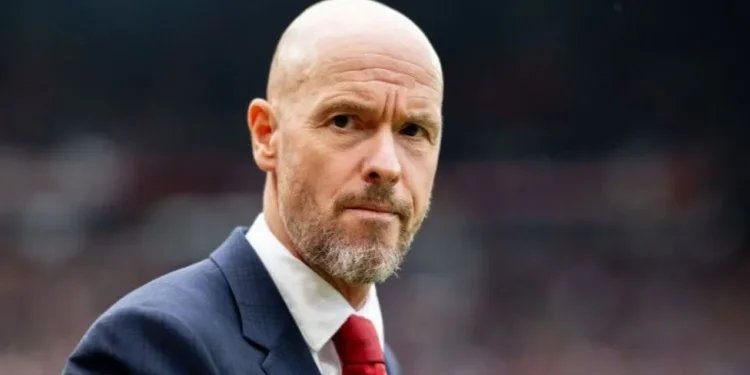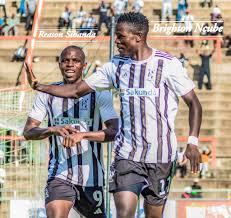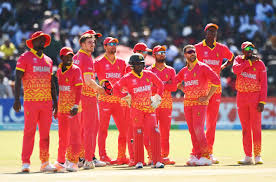Manchester United manager Erik ten Hag has the backing of senior Old Trafford figures to deliver the sustained success the club craves.
After surviving an eighth-placed finish last season – United’s worst since 1990 – thanks to the FA Cup final win against Manchester City, the Dutchman is under pressure again after Sunday’s 3-0 home defeat by Liverpool.
The result dropped United to 14th in the Premier League, with three points from their opening three games.
If they lose at Southampton after the international break on 14 September, it will represent their worst start since 1986-87, when they picked up one point from their first four games. Within two months, Ron Atkinson was sacked and replaced by Sir Alex Ferguson.
For now at least, Ten Hag has the support of the new football structure put in place by co-owner Sir Jim Ratcliffe.
Speaking to reporters before the Liverpool game, both chief executive Omar Berrada and sporting director Dan Ashworth confirmed that although neither was involved in the post-season review that determined Ten Hag would keep his job, even in the event of a heavy defeat to Liverpool – which turned into reality – the Dutchman still had their backing.
“It was a decision taken prior to both of our arrivals, but we are very happy with it,” said Berrada.
“Erik has our full backing. We think he is the right coach for us.
“We have worked very closely together in this transfer window and we are going to continue working very closely with him to help get the best results out of the team.”
Although Brighton sacked Chris Hughton as manager three months after Ashworth began work as the Seagulls technical director in 2019, Eddie Howe remained as Newcastle manager throughout the 53-year-old’s 19 months at St James’ Park.
Ashworth said it was not unusual for a sporting director to link up with a manager already in place.
“Very rarely do you go into a job as a sporting director and there is no manager in place,” he added.
“All I can do is reiterate that I’ve really enjoyed working with Erik for the last eight weeks.
“My job is to support him in every way I possible can, whether that’s operationally, with recruitment, medical, psychology, [and] the training ground flow to allow him to fully focus on the training pitch and match tactical plan, to deliver success for Manchester United.”
‘We are not kicking players out of the club’
Jadon Sancho waves to the crowd at Stamford Bridge
Confirmed in his role on 1 July after spending an extended period of time on gardening leave after telling Newcastle he wanted to quit, Ashworth’s concentration during his early weeks at United was solely focused on the transfer window.
He estimates 32 deals were done, including signings, sales and new contracts, including one for skipper Bruno Fernandes, which he said was “a crucial part of the transfer strategy”.
One of the most high-profile exits was not confirmed until long after the transfer window closed.
United are still paying a small portion of England forward Jadon Sancho’s salary following his move to Chelsea, but with the deal containing an obligation to make the switch permanent in 12 months, Ashworth feels it was the best outcome for both parties.
“We are not kicking players out of the club, but when they have a preference to move and it is right for them and us, you have to explore it, whether it’s Jadon, Scott [McTominay] or Aaron [Wan-Bissaka].
“We’ve got four really good wide players, so we felt we had enough depth in that particular position to cover it, which enabled is to make the decision.”
‘Be brave in making decisions you don’t want to make’
Manchester United co-owner Sir Jim Ratcliffe, chief executive Omar Berrada and sporting director Dan Ashworth at Old Trafford
Manchester United chief executive Omar Berrada (centre) and sporting director Dan Ashworth (right)
In an extensive chat, Ashworth and Berrada also spoke about a number of other transfer-related issues.
Are you confident in the squad now?
Dan Ashworth:
“I’ve probably done 25 windows now. I don’t think there’s ever been one where we’ve gone, ‘it’s gone absolutely perfectly, we’ve done every single in and every single out’.
“But in the main, with the target positions we wanted to strengthen, the players we’ve brought in and the depth and options Erik has when everybody is fully fit that Erik has, I’m pleased yes.”
How long will it take for you to be consistently successful?
Omar Berrada:
“It’s almost impossible to put a timescale to that question. When you look at the teams who have been successful consistently for many years it’s because they have the right coach, have signed the right players and have the right structure.
“You need to take good decisions consistently for many years to get into a position where you are a financially sustainable club that is competing to win every single competition. That is where we want to be.
“We don’t want to just win one Premier League and be satisfied. We want to create a team that is capable of competing for the Champions League, for the Premier League and for the domestic cups on a consistent basis. To build that, we need to be doing more of what we have done in this window.
“Dan and the team did a fantastic job in the negotiations process. If you make a mistake and you overspend or get a player who can cost you too much, it can set you back. Which is why you need to be able to take those decisions and make the right ones consistently over time to be in a position to win consistently.
“There will be some mistakes that we made, it’s normal there are certain factors we can’t control. But all of the controllables, we are going to put our best foot forward to get it right.”
Have you adopted a different approach to selling players?
Omar Berrada:
“The process for selling is very similar to the process for buying. You have a framework, you know what you are trying to achieve and it has to make sense for the club and the player. If you stay within those parameters and you are decisive, then generally you get it right.
“It is true we have been more open to structuring the contracts in a way that can deliver value for us in the short-term, but also in the future, introducing higher sell-ons and more realistic contingents. We have done that with practically all of the players who have gone out.
“We have also tried to put in place certain policies to protect us in the future. So we have the ability to buy back a player, Willy Kambwala for instance, if he does really well.”
Dan Ashworth:
“Sometimes you have to be quite brave and make decisions that maybe you don’t want to make. You can’t have a bloated squad, and you’re also dealing with players that ultimately want to play football.
“The schedule, especially with the new Europa League format, is pretty punishing. So we want to make sure we’ve got enough depth while keeping the players motivated, and with the thought that they’ve got a chance of playing.
“If you run with too big a squad, it can cause problems. The rules and regulations mean you have to churn. You have to generate money to be able to spend that money back out as well. So the number of one-club players is probably changing. That’s an unintended consequence of the rules and regulations.”












